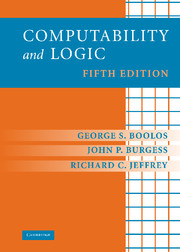Book contents
- Frontmatter
- Contents
- Preface to the Fifth Edition
- COMPUTABILITY THEORY
- 1 Enumerability
- 2 Diagonalization
- 3 Turing Computability
- 4 Uncomputability
- 5 Abacus Computability
- 6 Recursive Functions
- 7 Recursive Sets and Relations
- 8 Equivalent Definitions of Computability
- BASIC METALOGIC
- FURTHER TOPICS
- Annotated Bibliography
- Index
4 - Uncomputability
Published online by Cambridge University Press: 05 June 2012
- Frontmatter
- Contents
- Preface to the Fifth Edition
- COMPUTABILITY THEORY
- 1 Enumerability
- 2 Diagonalization
- 3 Turing Computability
- 4 Uncomputability
- 5 Abacus Computability
- 6 Recursive Functions
- 7 Recursive Sets and Relations
- 8 Equivalent Definitions of Computability
- BASIC METALOGIC
- FURTHER TOPICS
- Annotated Bibliography
- Index
Summary
In the preceding chapter we introduced the notion of Turing computability. In the present short chapter we give examples of Turing-uncomputable functions: the halting function in section 4.1, and the productivity function in the optional section 4.2. If Turing's thesis is correct, these are actually examples of effectively uncomputable functions.
The Halting Problem
There are too many functions from positive integers to positive integers for them all to be Turing computable. For on the one hand, as we have seen in problem 2.2, the set of all such functions is nonenumerable. And on the other hand, the set of Turing machines, and therefore of Turing-computable functions, is enumerable, since the representation of a Turing machine in the form of quadruples amounts to a representation of it by a finite string of symbols from a finite alphabet; and we have seen in Chapter 1 that the set of such strings is enumerable. These considerations show us that there must exist functions that are not Turing computable, but they do not provide an explicit example of such a function. To provide explicit examples is the task of this chapter. We begin simply by examining the argument just given in slow motion, with careful attention to details, so as to extract a specific example of a Turing-uncomputable function from it.
To begin with, we have suggested that we can enumerate the Turing-computable functions of one argument by enumerating the Turing machines, and that we can enumerate the Turing machines using their quadruple representations.
- Type
- Chapter
- Information
- Computability and Logic , pp. 35 - 44Publisher: Cambridge University PressPrint publication year: 2007



